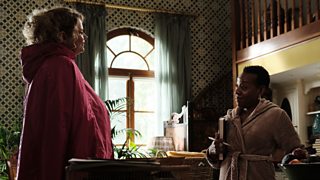The Following Events are Based on a Pack of Lies is the story of two very different women and the conman they have in common. Writers, Penelope and Ginny Skinner introduce the brand new five-part comedic, unpredictable thriller which portrays a tangled triangle of complexly layered half-truths and lies of epic proportions.
Watch the trailer for The Following Events are Based on a Pack of Lies
Can you talk a little bit about the inspiration behind the series?
Penelope: So, we were doing some research around con artists, and we learned that there was a strong correlation between the behaviours, patterns and tactics of con artists and how they operate on their victims and other kinds of abuse, for example domestic violence. And we wanted to write a story which explored that and which put the victims of that abuse at the centre.
Ginny: There are new ways of communicating now, but the way that we con people has basically stayed the same, because it’s about lying and convincing somebody that the world is different than it really is. This is something that happens quite a lot on social media, I think, which makes it quite a relevant story.
What about the title? It’s quite unusual, but it’s perfect. Who came up with that?
Ginny: We went through various options, but that one, which wasn’t our original title, was on the first page of the pitch that we brought to . After we’d been through a number of different titles, none of which quite worked, I think it was Naomi [De Pear] who suggested that we could just use the whole thing as the title. As soon as she mentioned it, it just sort of clicked. It seemed like a really fun idea, and it really fitted the show. It was there from the beginning, hiding in plain sight.

(L-R);Alice (REBEKAH STATON);Cheryl (MARIANNE JEAN BAPTISTE) Photo Credit: ±«Óãtv/Sister/Ludovic Robert
Can you tell us a bit about Alice and Cheryl’s relationship?
Ginny: Well, the problem with Cheryl - the fundamental flaw, in fact, with Cheryl and Alice, is that their relationship is based on a lie that Alice tells right at the start. And so, from then on, even though they are on the same side and working towards the same cause, trust is always going to be a big issue for them.
Penelope: Alice is in a kind of catch 22 as she feels if she exposes the truth about Rob to Cheryl, she may not be believed. So she goes down this path of using the tactics that maybe she’s learned from Rob himself in the past in order to try and expose the truth about Rob and ultimately help Cheryl.
So anyone is capable of conning, it doesn’t have to be as sinister as Rob. Would you agree?
Penelope: You could do it. You might not feel very good about yourself when you’re doing it, but anyone could learn the tactics. There are steps and patterns.
Ginny: But most people with any empathy would choose not to do it because of the damage.
Penelope: Which is part of the journey that Alice goes on in the show. When she sets out, Alice wants to right the wrongs she feels were done to her and her family in the past. But as things go on, she begins to realise the effect that it’s having on Cheryl. And I think she realises that Rob needs to be stopped entirely. When Cheryl finds out that she has essentially been betrayed by somebody she thought was her friend, there’s a moment when she has to decide what’s more important – whether stopping Robbie is more important than her anger towards Alice… you’ll have to see what happens.

(L-R);Cheryl (MARIANNE JEAN BAPTISTE);Rob (ALISTAIR PETRIE) Photo Credit: ±«Óãtv/Sister/Ludovic Robert
The series addresses a variety of topics: family, trauma, depression. Can you talk a bit about some of these key themes?
Penelope: The trauma of being the victim of a con is something that we really wanted to explore, both as an individual and the family around that victim, and even the community around them. Because in the case of Alice, lots of people have given money to that scam, and they’ve persuaded other people to give money to that scam. So, it is very traumatising when you realise that you’ve been complicit in other people becoming victims. And we wanted to look at the trauma in the long-term of being a victim of a scam. It’s something that really can affect your self-esteem, your ability to trust other human beings. We wanted to show that relationship 20 years later, in a way, because this is something that is still affecting them: every day they are still living with the financial, emotional and psychological repercussions of this crime which happened to them, basically, which has never been prosecuted. That’s very common with this kind of crime.
And the cast, of course, is amazing. How involved were you in the casting process for this?
Penelope: Very involved. Lots of online meetings. It was very important to us to cast the three of them together because that triangle, if you like, is such an important part of the whole story, that they all fit together. And we feel very happy with how that went.
Ginny: I think like all really good actors, they take the character and take it to the next level so that they have now occupied our imagination as those characters, and we hear their voices as the voices of the character. Yeah, they’re great.

Alice (REBEKAH STATON) Photo Credit: ±«Óãtv/Sister/Ludovic Robert
And the last question, why do you think audiences are so fascinated by crime for entertainment and con man stories? Do you think people take it seriously enough?
Penelope: Con artists break boundaries, don’t they? And they know how to beat the system, and that makes them successful in getting their aims and in achieving the goals.
Ginny: And in this story, Cheryl and Alice have to go outside their comfort zones, break some boundaries, and beat the system in their own way. And that’s what makes it interesting.
Penelope: I suppose that as a society, maybe we don’t take it seriously enough. I do think we’re becoming more aware of the impact of this behaviour on individuals. But it is still really difficult to prosecute, it is still really difficult to gather evidence.
Ginny: The police do take it seriously, but they are also aware of how little they can do. We spoke to the police when we were making the show, and they made it very clear that it’s very difficult to get enough proof, especially when these cons often don’t come to light at the time. It often takes a while for victims to realise that they’ve been conned. And then there’s a lot of shame about coming forward. So, that scene in the police station where Alice comes to terms with what’s happened to her and tells somebody for the first time is important, I think.
